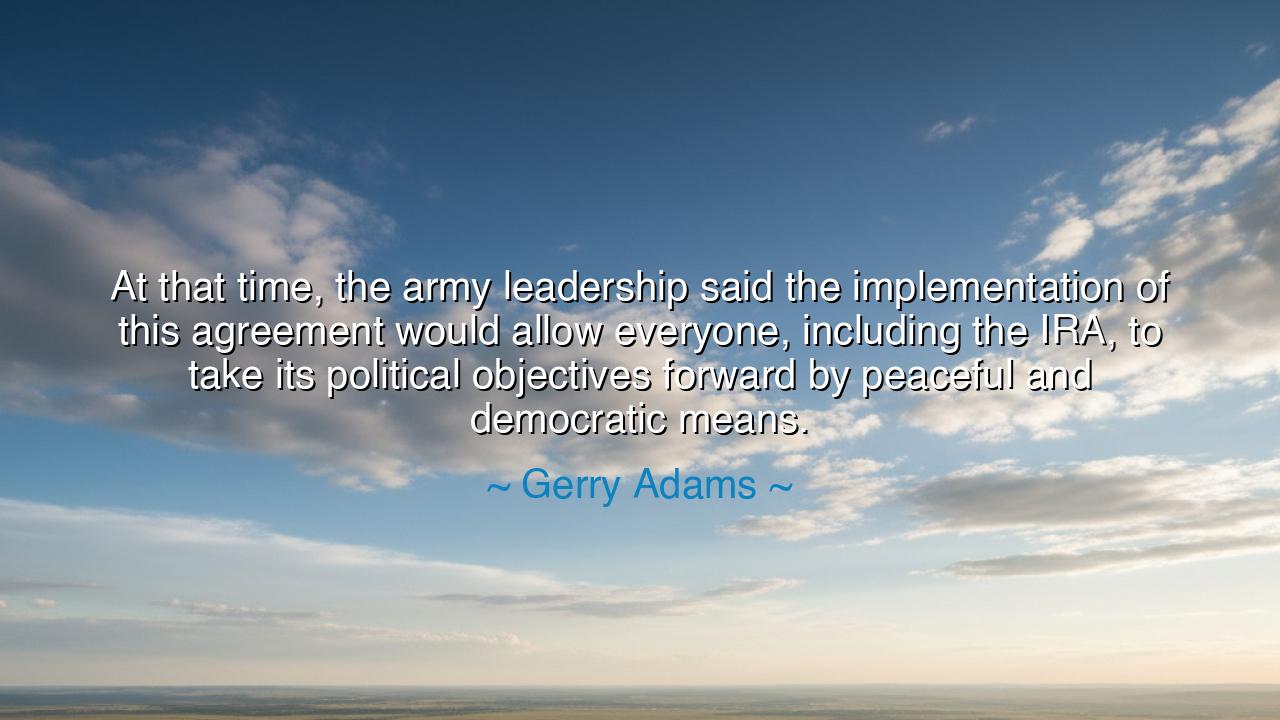
At that time, the army leadership said the implementation of this
At that time, the army leadership said the implementation of this agreement would allow everyone, including the IRA, to take its political objectives forward by peaceful and democratic means.






“At that time, the army leadership said the implementation of this agreement would allow everyone, including the IRA, to take its political objectives forward by peaceful and democratic means.” — Gerry Adams
In these words, Gerry Adams, one of the key figures of Ireland’s long and bitter struggle, speaks of a turning point not just in politics, but in the human heart. His statement reflects the dawn of an era — the moment when men who had fought in the shadows began to lay down their arms and step into the light. Behind his calm phrasing lies centuries of sorrow and strife, the endless echo of rebellion and reprisal. For generations, the Irish Republican Army (IRA) had carried its cause through violence, believing that justice could only be won by force. Yet, with the emergence of peace agreements like the Good Friday Agreement, a new path was revealed — one where political objectives could be pursued not through the bullet, but through the ballot.
To understand Adams’s words, one must recall the depth of the wound that divided Ireland. The conflict known as “The Troubles” spanned decades, claiming thousands of lives, pitting neighbor against neighbor, and leaving a legacy of fear and mistrust. It was not simply a political struggle; it was a struggle of identity — between those who sought a united Ireland and those who wished to remain within the United Kingdom. For many, peace seemed impossible, for how could peace grow in soil watered by so much blood? Yet Adams’s words remind us that even after the darkest storms, the human spirit yearns for reconciliation.
In this moment of history, the army leadership — referring to the IRA’s command — recognized a truth that the ancients had long known: that the sword may win victories, but only wisdom and patience can build a lasting peace. By agreeing to the political process, they chose to transform their energy from destruction into dialogue. They discovered what leaders from all ages have learned — that true strength lies not in domination, but in restraint; not in the silencing of enemies, but in the courage to listen.
Consider the parallel of Nelson Mandela, who, after twenty-seven years of imprisonment, chose not vengeance but negotiation. He, too, understood that the path to freedom must eventually pass through forgiveness. Like Adams, Mandela realized that liberation achieved by violence alone leaves the spirit enslaved. Both men proved that peace is not the absence of conflict, but the mastery of it — the ability to channel the same passion that once fueled rebellion into the creation of a just and democratic future.
Adams’s quote captures this transformation. It speaks of a time when warriors began to see the futility of endless retaliation, when they realized that the dream of a free nation cannot be born from the ruins of another’s pain. By embracing peaceful and democratic means, the movement that had once lived by the gun began to live by the vote — and in doing so, it preserved the dignity of its cause while sparing the lives of generations yet unborn. This shift was not weakness, but evolution — a sign that the Irish struggle had matured from the battlefield to the parliament floor, from blood to ballots, from despair to hope.
The ancients would have called this moment the triumph of logos over chaos — the victory of reason over rage. For all great civilizations have faced the same crossroads: to choose between the ease of violence and the difficulty of peace. The Roman general Scipio Africanus, after defeating Carthage, wept for his enemies as he watched their city burn, for he saw in their destruction the shadow of his own people’s fate. Adams’s Ireland faced a similar reflection: to continue the war would have been to destroy what they sought to save. Thus, peace became the ultimate act of courage — the courage to trust in humanity’s better nature.
Let the lesson of Adams’s words be a lamp to our own age. Wherever conflict still divides — in nations, in communities, in hearts — remember that violence may win submission, but only dialogue wins transformation. To bring forth a better world, one must believe, as Ireland eventually did, that the pen is mightier not because it wounds less, but because it heals more. Peace does not erase history; it redeems it.
So, to all who hear this teaching: when you stand before your own battles — whether of pride, anger, or injustice — remember the wisdom of that moment in Ireland. Lay down your weapon, and lift up your voice. For the true victory is not to conquer others, but to conquer the impulse within oneself that divides and destroys. Then, like the Irish who once fought and then forgave, you too shall find that the hardest road is the one that leads not to triumph, but to understanding — and in that understanding lies the power to build a peace that endures beyond all generations.






AAdministratorAdministrator
Welcome, honored guests. Please leave a comment, we will respond soon